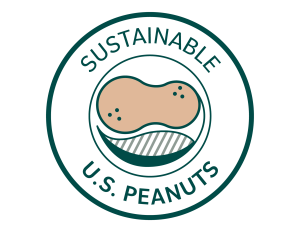
Dan Ward is a seventh-generation grower in Southeastern North Carolina. He currently serves as chair of the American Peanut Council’s sustainability committee and as president of the North Carolina Peanut Growers Association.
by Dan Ward
When someone asks what sustainability means to me, I pull out my phone and show them a photo of my two-year-old granddaughter, Blakely. In 20 to 25 years, I want Blakely to have the choice of becoming the ninth generation of our family to carry on our farm. For that to happen, I must stop and think about every operating decision I make and ask if what I’m doing today will help her make that decision. Critically, I must make sure our farm is productive and profitable so that if she decides to farm, there’s a farm for her to come back to.
For peanut growers to be productive and profitable we need to increase demand for peanuts, and in our current market one of the biggest drivers for demand is quickly becoming sustainability. As manufacturers increasingly must meet consumer, investor, and regulatory demands for sustainable farming practices, we are going to have to prove and document peanut sustainability.
We are already seeing this come to play in peanut export markets as our trading partners are progressively having sustainability expectations. Our competitors are hard at work documenting and demonstrating their peanut sustainability. It would be a sad situation for the U.S. to have an over-supply problem with growers having to accept lower contracts, all because foreign competitors have proven their sustainability, thus meeting those market demands.
Sustainability is not going anywhere. It’s only going to become more critical with each passing year. Currently, growers are in control and can help shape the process. But if we don’t voluntarily act now, the peanut industry could instead easily become a victim of onerous regulations and lost market share, which we’ve seen happen to other agriculture commodities.
That’s why I am committed to the Sustainable U.S. Peanuts Initiative.
In its third crop enrollment year, Sustainable U.S. Peanuts, or SUSP for short, is a voluntary, industry-wide and industry-supported initiative. It is buoying America’s peanut farmers with metrics on the most efficient use of on-farm resources, as well as encouraging farm operation sustainability practices that will help meet expectations, lead to increased demand for peanuts and set the stage for long-term economic viability.
Here’s how it works: Growers enroll by completing a self-assessment questionnaire and field-level survey. All farm information is private and is not shared with anyone. This is very important and bears repeating. Your farm information will never be shared. Joe A. will never be privy to his neighbor Mary B’s farm information, and neither will the government nor the industry.
Once enrolled in the SUSP, participants will need to maintain their involvement by annually updating their information, which is much faster after a grower’s initial enrollment. Are you part of the Cotton Trust Protocol? Great news! You can join that account with Sustainable U.S. Peanuts to streamline your enrollment.
Importantly, SUSP promotes the entire U.S. crop, not individual states or regions. That is why it’s critical to have peanut farmers from West Texas all the way to Southeast Virginia participate in the program. All peanut farmers’ voices must be heard for SUSP to be truly representative.
 Peanuts have an incredible sustainability story. They have the smallest carbon footprint of any nut and ounce for ounce use significantly less water than tree nuts. Peanuts are a zero-waste crop since all parts of the plant are utilized, and they require less fertilizer to grow since they are nitrogen-fixing. I would hate to think we have this great story to tell and yet miss our opportunity to sell more peanuts, or let someone enjoy our peanuts, because we aren’t taking that extra step to demonstrate peanut sustainability.
Peanuts have an incredible sustainability story. They have the smallest carbon footprint of any nut and ounce for ounce use significantly less water than tree nuts. Peanuts are a zero-waste crop since all parts of the plant are utilized, and they require less fertilizer to grow since they are nitrogen-fixing. I would hate to think we have this great story to tell and yet miss our opportunity to sell more peanuts, or let someone enjoy our peanuts, because we aren’t taking that extra step to demonstrate peanut sustainability.
So, what does success look like? For the peanut industry, it would be ensuring the long-term economic viability of growers; satisfying the sustainability interests of buyers, consumers and trading partners; and increasing demand for peanuts – both domestically and globally – without it being forced on growers.
Personally, success for me would be leaving our family farm in the best possible shape for my granddaughter Blakely to one day take the reins, if she chooses. I want her to have that choice because we have made smart decisions and done all the rights things to ensure a farming business that lasts, and one she can be proud of.
Learn more about Sustainable U.S. Peanuts Initiative and enroll your farm at: sustainableuspeanuts.org.
